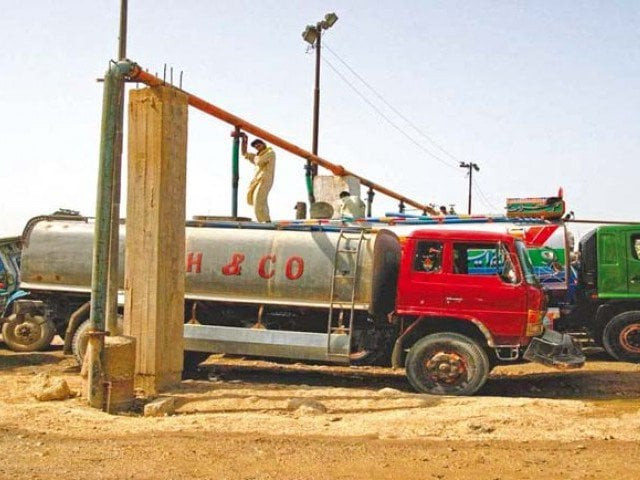Man-made problem: Who’s behind city’s artificial water crisis, SHC wants to know
Petitioner accuses water board workers of holding water, forcing people to buy from tankers

Petitioner accuses water board workers of holding water, forcing people to buy from tankers. PHOTO COURTESY: FARHAN ANWAR
As the Muttahida Qaumi Movement (MQM) launched its city-wide protests against water shortage in the city, the high court has also asked officials to explain who is behind this 'artificial' crisis.
On Friday, the Sindh High Court (SHC) directed the provincial minister for local bodies, the Karachi Water and Sewerage Board (KWSB) chairperson, the Karachi Metropolitan Corporation administrator, the commissioner and the provincial chiefs of the police and Rangers to submit reports to explain what action they have taken against officers involved in creating an artificial water crisis and running illegal water hydrants in Karachi.
A division bench, comprising justices Syed Hasan Azhar Rizvi and Hasan Feroz, directed the provincial law officer and the law officers of the relevant departments to file these reports by May 28. The two judges sought these reports after the respondents neither appeared in court nor submitted their replies since February.
The petition was filed by civil rights campaigner, Rana Faizul Hasan, who alleged that the local government officers, KWSB and KMC were behind the persistent shortage of water in the metropolis so that the mafia can steal water and then sell it to the citizens at exorbitant rates. He argued that the citizens were experiencing an acute shortage of water as the mafia was not only actively stealing the essential commodity but also selling it to the industrialists.
Hasan alleged that the 'valve men' of the KWSB do not release water in their localities and force the citizens to buy water from the tanker mafia.
Domestic water sold to industries
Apart from this, the petitioner claimed that around six million gallons from the domestic quota is stolen in the city's West zone every day and then sold to the industries to earn profits of up to Rs7.2 million, Hasan claimed. Similarly, around eight million gallons are stolen from the domestic quota in Site every month and then sold to the industries for Rs200 million.
Unauthorised hydrants
The petitioner also pointed out that legal water hydrants run by the KWSB are supposed to conduct their operations for four hours every day but the contractors, who are awarded contracts by the KWSB to operate these hydrants, are operating them beyond the fixed hours. The legal hydrants at Nipa Chowrangi, Garden and Sakhi Hasan are involved in excessive operations where more than one suction pump is being used to extract water, he added.
Under the official policy adopted in 2010 regarding water hydrants, KWSB is responsible to legally award tenders to private contractors to run its water hydrants. However, there are 117 illegal water hydrants operating across the metropolis details of which may be called from the board's managing director, claimed Hasan.
He argued that easy access to basic amenities, such as water, is the fundamental right of every citizen as guaranteed under Articles 4, 8, 9 and 25 of the Constitution but the authorities are failing to protect such rights.
During Friday's proceedings, the judges observed that notices were issued to the respondents on February 25 to file their comments but they failed to do so. The bench once again asked them to file their responses by May 28. The provincial law officer and legal officers of the relevant departments were asked to turn up with such replies at the next hearing.
Published in The Express Tribune, May 23rd, 2015.



















COMMENTS
Comments are moderated and generally will be posted if they are on-topic and not abusive.
For more information, please see our Comments FAQ